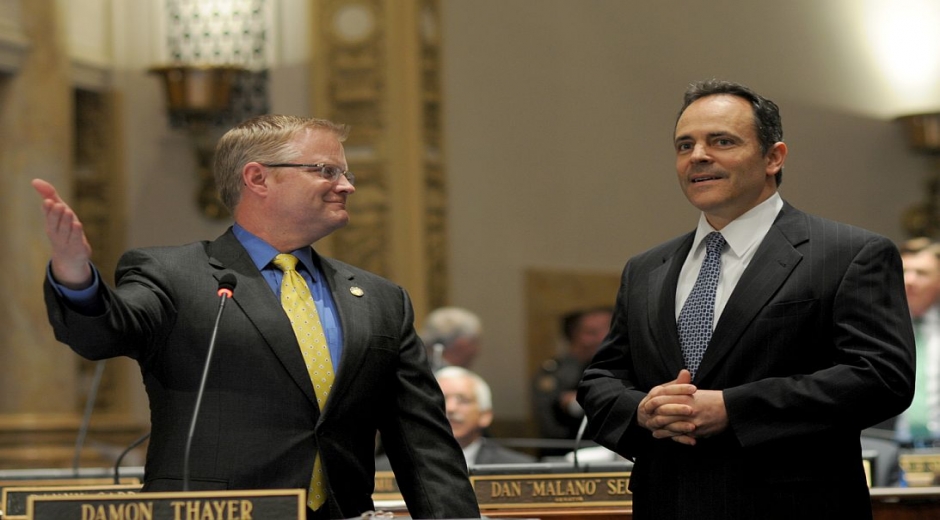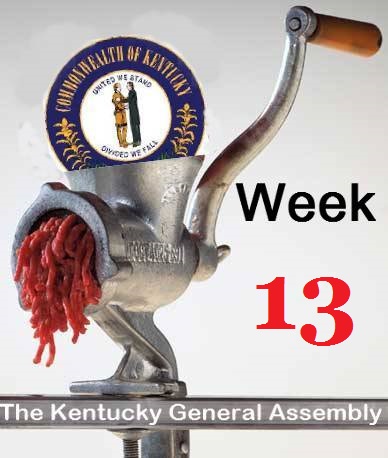
Week Thirteen Of The General Assembly

Thomas McAdam
iLocalNews Louisville is your best source of news and information about Derby City.
- Professional Journalist
Last weekend may have marked the opening day for baseball, but in the State Capitol the General Assembly is hoping to avoid going in to extra innings.
Already, lawmakers have worked long hours trying to reach a compromise on the state’s next two-year budget. That’s likely to continue in the days ahead as lawmakers strive to craft a spending plan that will be accepted by both the House and Senate.
With this week’s end, lawmakers have one legislative day left in the 2016 session before they reach the constitutional limit of 60 days and must adjourn. Under the constitution, the session cannot extend beyond April 15. If no spending plan is agreed upon by that time, lawmakers face the prospect of returning for a special session – which can only be called by the governor – to continue work on the next budget.
As the budget negotiations continued this past week, a number of other bills took steps forward in the legislative process. Among the measures passed, topics included:
Local government. The Senate passed House Bill 189 on Tuesday, which would make easier for local entities – like cities, police and fire departments – to share services. HB 189 sets procedures for amending interlocal agreements without the lengthy process of having to seek approval from the state Attorney General or the Department for Local Government. Under the bill, as long as the terms of the agreement are not being substantively changed, the parties can add new members without approval. The governor is now considering the bill.
Judicial transparency. Senate Bill 40 would allow some family court judges to hold public hearings. The bill, which the House passed on Tuesday, authorizes a handful of courts to hold the open hearings as a pilot project. Judges could volunteer their courts for the program, and close proceedings as necessary. After the House vote, it was delivered to the governor.
Restoring rights. Under House Bill 40, convicted felons would be able to clear some offenses off their records after serving their sentence. Five years after that sentence ends, they could then pay a fee and have the courts consider removing the offense from their record. Without a felony record, it could restore their voting rights. The bill, passed in the Senate on Tuesday and given final approval by the House on Friday, would not apply to perpetrators of violent or sex crimes. The bill will now be delivered to the governor.
Privacy. The House on Tuesday passed an amended House Bill 132, which seeks to end the practice of web sites or publications using jail booking photos for profit. The bill proposes stiff damages for posting images to a site or including them in a publication, then requiring payment to remove the photo from public view. Violators could be civilly prosecuted and be required to pay damages starting at $100 a day for each separate violation along with attorney fees. HB 132 is awaiting the governor’s signature.
Child safety. House Bill 148 would allow child day care centers to acquire prescriptions for EpiPens, auto-injected medication to prevent severely allergic people from going into anaphylactic shock. The bill, along with a Senate amendment extending provisions of the state’s safe harbor laws, received final passage in the House on Tuesday. The amendment gives parents up to 30 days – instead of the current three – to legally give up their newborn at a state-approved safe place if the parent feels they cannot keep the child. HB 148 is now with the governor.
Medicaid appeals. Senate Bill 20, which would give medical providers access to independent appeals of denied Medicaid claims, received final passage Monday in the House and was sent to the governor’s office. Per SB 20, the decision of the third-party reviewer could then be appealed to the Cabinet for Health and Family Services, where the decision of an administrative hearing tribunal would be the last step before judicial review.
Veterans affairs. House Bill 487, passed by the Senate on Tuesday and sent to the governor, would require that at least two members of the Governor’s Advisory Board for Veterans Affairs be veterans recommended by the Joint Executive Council of Veterans Organizations of Kentucky. The governor currently appoints members of the seven-member board to three-year terms without such restrictions.
To stay atop of the legislative process, track the progress of bills, offer feedback to your lawmakers or merely to ask questions about your state government, call the General Assembly’s toll-free message line at 800-372-7181.
Photo: Senate Majority Floor Leader Damon Thayer, R-Georgetown (left), invites Gov. Matt Bevin to assume the president's desk to address the Kentucky Senate. 03/29/16 (LRC Public Information Photo)
(Robert Weber, of the Kentucky Legislative Research Commission contributed to this article)

Gideon John Tucker (February 10, 1826 – July 1899) was an American lawyer, newspaper editor and politician. In 1866, as Surrogate of New York, he wrote in a decision of a will case (Final Accounting in the Estate of A.B., 1 Tucker 248, N.Y. Surr. 1866): "No man's life, liberty or property are safe while the Legislature is in session."